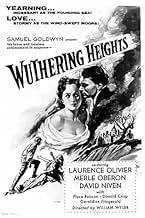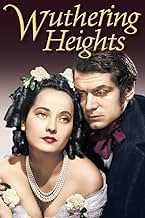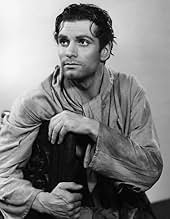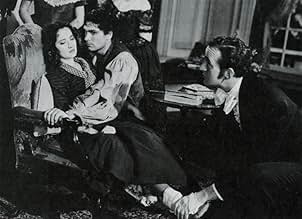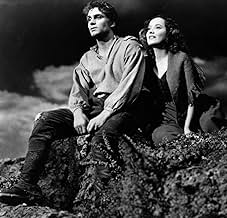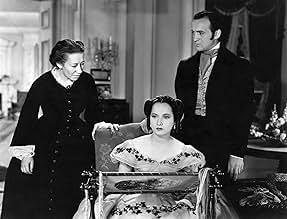IMDb-BEWERTUNG
7,5/10
20.870
IHRE BEWERTUNG
Ein Diener im Haus der Sturmhöhe erzählt einem Reisenden die unglückliche Geschichte der Liebhaber Cathy und Heathcliff.Ein Diener im Haus der Sturmhöhe erzählt einem Reisenden die unglückliche Geschichte der Liebhaber Cathy und Heathcliff.Ein Diener im Haus der Sturmhöhe erzählt einem Reisenden die unglückliche Geschichte der Liebhaber Cathy und Heathcliff.
- 1 Oscar gewonnen
- 9 Gewinne & 7 Nominierungen insgesamt
Sarita Wooton
- Cathy (as a child)
- (as Sarita Wooten)
Frank Benson
- Heathcliff Servant
- (Nicht genannt)
Romaine Callender
- Robert
- (Nicht genannt)
Richard Clucas
- Little Boy
- (Nicht genannt)
Vernon Downing
- Giles
- (Nicht genannt)
Empfohlene Bewertungen
10jotix100
"Wuthering Heights", based on the novel by Emily Bronte, gets a first rate treatment from its director, the genial William Wyler. The adaptation was done by Charles McArthur and Ben Hecht, two of the best writers working in the Hollywood of that era. The great cinematography by Gregg Toland makes it visually stunning. Alfred Newman's music score plays in the background, making this film a classic that will be cherished by movie lovers.
Some comments to this forum express their displeasure in the adaptation one sees on the screen. Most people forget what a task it must have been to get the essence of the Bronte novel in a cinematic form, something the adapters did with elegance and charm.
The cast that was assembled for "Wuthering Heights" is a dream come true. Presenting the young Merle Oberon in all her beauty makes one almost fall instantly in love with her. Ms. Oberon had a fantastic presence, which translated in probably her best work in films.
The dashingly handsome Laurence Olivier as Heathcliff, creates the right chemistry against Ms. Oberon's Cathy. Mr. Olivier was at the pinnacle of his career. He responds well to Mr. Wyler's direction. His Heathcliff shows a mean streak, but over all, Olivier gives an impressive performance.
David Niven is excellent as Edgar Linton, the man who wins Cathy's heart with his kindness. Flora Robson does also an outstanding job as Ellen, the housekeeper, who serves as the narrator. The young and beautiful Geraldine Fitzgerald makes a brilliant Isabella.
The rest of the players are equally wonderful, Donald Crisp, Hugh Willimas, Leo G. Carroll, Cecil Kellaway, made contributions to the movie.
Ultimately, this film is a love story doomed from the beginning. This tale of the passion between the lovers in the moors is a perfect way to lose oneself in the magic of the movies.
Some comments to this forum express their displeasure in the adaptation one sees on the screen. Most people forget what a task it must have been to get the essence of the Bronte novel in a cinematic form, something the adapters did with elegance and charm.
The cast that was assembled for "Wuthering Heights" is a dream come true. Presenting the young Merle Oberon in all her beauty makes one almost fall instantly in love with her. Ms. Oberon had a fantastic presence, which translated in probably her best work in films.
The dashingly handsome Laurence Olivier as Heathcliff, creates the right chemistry against Ms. Oberon's Cathy. Mr. Olivier was at the pinnacle of his career. He responds well to Mr. Wyler's direction. His Heathcliff shows a mean streak, but over all, Olivier gives an impressive performance.
David Niven is excellent as Edgar Linton, the man who wins Cathy's heart with his kindness. Flora Robson does also an outstanding job as Ellen, the housekeeper, who serves as the narrator. The young and beautiful Geraldine Fitzgerald makes a brilliant Isabella.
The rest of the players are equally wonderful, Donald Crisp, Hugh Willimas, Leo G. Carroll, Cecil Kellaway, made contributions to the movie.
Ultimately, this film is a love story doomed from the beginning. This tale of the passion between the lovers in the moors is a perfect way to lose oneself in the magic of the movies.
One of the finest romantic films ever filmed, this 1939 Samuel Goldwyn production rates with many - including myself - as being the most beloved version of Emily Bronte's haunting novel. Although it stops at chapter seventeen and the ending is seen as a bit trite by some, it's a brilliantly enacted, finely mounted production with beautiful photography and authentic period detail set-wise. Merle Oberon is well-cast as the selfish, vain and rather shallow Cathy. What makes her character so intriguing and interesting is that no matter what happens to her materially, she has an undying love for the gypsy-blooded heathen named Heathcliff. Laurence Olivier, never a great success in films prior to this, gives a brutally honest account of everything Bronte's Heathcliff should be: proud, bold, vengeful & darkly brooding -a tortured soul in general. Wyler's guiding hand is patent throughout: it was Olivier himself who gave credit to the meticulous director in teaching him the particular ropes of screen acting: it shows! Lady-like Isabella is well-played by the Irish Geraldine Page, while Ellen, the long-suffering servant is played sympathetically by the fine character actress Flora Robson. David Niven, ideally cast as the milquetoasty Edgar Linton, actually had a clause in his contract which freed him from having to do crying scenes! A timeless masterpiece of the "haunting" love story genre, this was Goldwyn's personal favourite of all his films.
Director William Wyler and star Laurence Olivier bring to life the atmosphere and most important characters of a classic novel in "Wuthering Heights". While necessarily omitting much of the material for cinematic purposes, and having a slightly different emphasis, the film version will still be appreciated by those who enjoy classic stories.
The Emily Brontë novel on which the film is based is one of the greatest books of its kind. It is far deeper than any film version could be, so for this movie only a portion of the story is used, and several characters are omitted. The movie also has more of a melodramatic feel than did the novel. It does retain the flashback-style of narrative, which works just as well in the film as it did in the book.
The story opens with a weary traveler meeting up with a now-aging, hostile, and excitable Heathcliff (Olivier), after the main action of the story is in the past. Unsettled by this strange man, the traveler is told Heathcliff's story by the housekeeper Ellen (Flora Robson). This begins with Heathcliff's childhood, and goes through his relations with the Earnshaw family and the Linton family. The heart of the story is his troubled romance with Catherine Earnshaw (Merle Oberon), whom he has known since being taken in by her family as a child. This relationship in turn leads to conflicts with most of the other characters, and affects the lives of everyone involved in profound ways.
Olivier memorably portrays this difficult character, and helps the audience feel his longing and restlessness. Oberon is also ideal as Catherine - a mercurial character who is both a complement and a contrast to Heathcliff. The other main strength of the film is its realization of the main settings, which are almost as important to the story as the characters are: once-fine but now gloomy and declining Wuthering Heights; the pleasant but vapid Thrushcross Grange, home of the Linton family; and especially the wild, mysterious Yorkshire moors, the only place where Heathcliff and Cathy are ever really happy. These settings are all effectively created and photographed, and provide an appropriate background to the events and tensions in the characters' lives.
The result is a movie that, while lacking the complexity of the novel, is a satisfying realization of the most important aspects of the book, and which effectively brings the audience into the lives and hearts of the characters.
The Emily Brontë novel on which the film is based is one of the greatest books of its kind. It is far deeper than any film version could be, so for this movie only a portion of the story is used, and several characters are omitted. The movie also has more of a melodramatic feel than did the novel. It does retain the flashback-style of narrative, which works just as well in the film as it did in the book.
The story opens with a weary traveler meeting up with a now-aging, hostile, and excitable Heathcliff (Olivier), after the main action of the story is in the past. Unsettled by this strange man, the traveler is told Heathcliff's story by the housekeeper Ellen (Flora Robson). This begins with Heathcliff's childhood, and goes through his relations with the Earnshaw family and the Linton family. The heart of the story is his troubled romance with Catherine Earnshaw (Merle Oberon), whom he has known since being taken in by her family as a child. This relationship in turn leads to conflicts with most of the other characters, and affects the lives of everyone involved in profound ways.
Olivier memorably portrays this difficult character, and helps the audience feel his longing and restlessness. Oberon is also ideal as Catherine - a mercurial character who is both a complement and a contrast to Heathcliff. The other main strength of the film is its realization of the main settings, which are almost as important to the story as the characters are: once-fine but now gloomy and declining Wuthering Heights; the pleasant but vapid Thrushcross Grange, home of the Linton family; and especially the wild, mysterious Yorkshire moors, the only place where Heathcliff and Cathy are ever really happy. These settings are all effectively created and photographed, and provide an appropriate background to the events and tensions in the characters' lives.
The result is a movie that, while lacking the complexity of the novel, is a satisfying realization of the most important aspects of the book, and which effectively brings the audience into the lives and hearts of the characters.
Talk about a brooding outdoors, those moody moors may represent a sense of liberation for the lovers, but they're not exactly inviting. Besides, it rains all the time, so best to be in the house even if mansions represent the confining space of class and class privilege. That's the trouble. Cathy is 'to the manor born', as they say. Thus she's really torn between the wild outdoors and the comforts of ballrooms and servants.
Then there's the enigmatic Heathcliffe, a dark wild-souled type guy, perfectly at home in those bleak rolling hills. He was a street ragamuffin before Cathy's elderly father adopted him into the manor as a stable boy. But he and a young Cathy manage to bond despite the class difference, a bond that eventually blossoms into true love. But that true love only breaks to the surface in the wild outdoors where a common humanity replaces artificial social distinctions. If only Cathy could find the will to break free of the leisure class.
What a great visual experience, the b&w expertly coordinated with the settings. When the two lovers approach the rocky crag, there's almost a feeling of an outdoor altar calling to them amidst the brooding hills. It's such a perfect visual contrast to the high-key ballrooms and parlors of the Lintons. The Lintons, however, are not to be despised despite their airs and privileges. In fact, they are very real victims of Cathy's suppressed feelings and Heathcliffe's cold calculations. As it turns out, there is no spectral salvation for them. As a result, the love being portrayed here is a kind of mad love, one that brings tragedy to all concerned. Thus, there's a reason those moors brood in dark fashion, while the movie itself remains the best of the many makes and remakes.
Then there's the enigmatic Heathcliffe, a dark wild-souled type guy, perfectly at home in those bleak rolling hills. He was a street ragamuffin before Cathy's elderly father adopted him into the manor as a stable boy. But he and a young Cathy manage to bond despite the class difference, a bond that eventually blossoms into true love. But that true love only breaks to the surface in the wild outdoors where a common humanity replaces artificial social distinctions. If only Cathy could find the will to break free of the leisure class.
What a great visual experience, the b&w expertly coordinated with the settings. When the two lovers approach the rocky crag, there's almost a feeling of an outdoor altar calling to them amidst the brooding hills. It's such a perfect visual contrast to the high-key ballrooms and parlors of the Lintons. The Lintons, however, are not to be despised despite their airs and privileges. In fact, they are very real victims of Cathy's suppressed feelings and Heathcliffe's cold calculations. As it turns out, there is no spectral salvation for them. As a result, the love being portrayed here is a kind of mad love, one that brings tragedy to all concerned. Thus, there's a reason those moors brood in dark fashion, while the movie itself remains the best of the many makes and remakes.
This classic version of the Bronte novel is probably familiar to most movie fans, and with good reason. Although the recent Ralph Fiennes version is also excellent, nothing can quite surpass the 1939 film's bleak black-and-white cinematography or the impassioned performance of Laurence Olivier. Some of us still mourn that his then-wife, Vivien Leigh, wasn't granted her wish to be cast as Catherine, but Merle Oberon is nonetheless excellent: her Catherine isn't quite likable, but then, she isn't supposed to be. Instead of sugar-coating the story as Hollywood is so wont to do, the filmmakers give us Cathy and Heathcliff as they should be: ruthless, selfish, destructive, and fascinating. The only major drawback is the saccharine musical score, which tries to make this wild, haunting story into a candy-box romance. Fortunately, all the other elements resist this tendency. Even though the film only covers half the novel, you'll find it satisfying and unforgettable.
Wusstest du schon
- WissenswertesLaurence Olivier found himself becoming increasingly annoyed with director William Wyler's exhausting style of filmmaking. After yet another take, he is said to have exclaimed, "For God's sake, I did it sitting down. I did it with a smile. I did it with a smirk. I did it scratching my ear. I did it with my back to the camera. How do you want me to do it?" Wyler's retort was, "I want it better." However, Olivier later said these multiple takes helped him learn to succeed as a movie actor.
- PatzerThough the social situations, and even the soundtrack, are consistent with the novel's timeframe of 1770-1801, the Colonial/Napoleonic era, the costumes are an odd mix of mid-Victorian and American Civil War.
- Zitate
Heathcliff: Catherine Earnshaw, may you not rest so long as I live on! I killed you. Haunt me, then! Haunt your murderer! I know that ghosts have wandered on the Earth. Be with me always. Take any form, drive me mad, only do not leave me in this dark alone where I cannot find you. I cannot live without my life! I cannot die without my soul.
- Crazy CreditsOpening credits prologue: On the barren Yorkshire moors in England, a hundred years ago, stood a house as bleak and desolate as the wastes around it. Only a stranger lost in a storm would have dared to knock at the door of Wuthering Heights.
- Alternative VersionenThere is an Italian edition of this film on DVD, distributed by DNA Srl: "CIME TEMPESTOSE (1939) + ORGOGLIO E PREGIUDIZIO (1940)" (2 Films on a single DVD), re-edited with the contribution of film historian Riccardo Cusin. This version is also available for streaming on some platforms.
- VerbindungenFeatured in Salut für ...: A Tribute to William Wyler (1976)
- SoundtracksPiano Sonata in A major, K.331: Rondo alla Turca
(1778) (uncredited)
Music by Wolfgang Amadeus Mozart
Played by Alice Ehlers on harpsichord
Top-Auswahl
Melde dich zum Bewerten an und greife auf die Watchlist für personalisierte Empfehlungen zu.
Details
- Erscheinungsdatum
- Herkunftsland
- Offizieller Standort
- Sprache
- Auch bekannt als
- Sturmhöhe
- Drehorte
- Produktionsfirma
- Weitere beteiligte Unternehmen bei IMDbPro anzeigen
Box Office
- Bruttoertrag in den USA und Kanada
- 624.643 $
- Eröffnungswochenende in den USA und in Kanada
- 15.493 $
- 9. Apr. 1989
- Weltweiter Bruttoertrag
- 624.643 $
- Laufzeit
- 1 Std. 44 Min.(104 min)
- Farbe
- Seitenverhältnis
- 1.37 : 1
Zu dieser Seite beitragen
Bearbeitung vorschlagen oder fehlenden Inhalt hinzufügen


